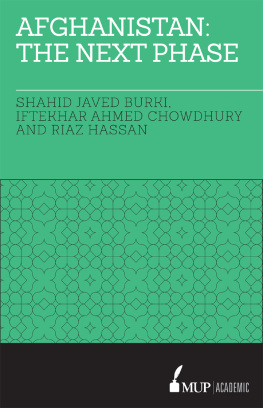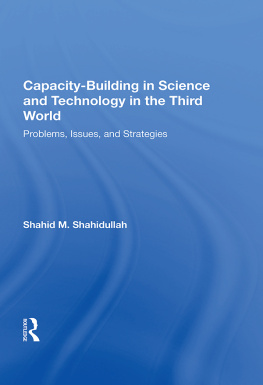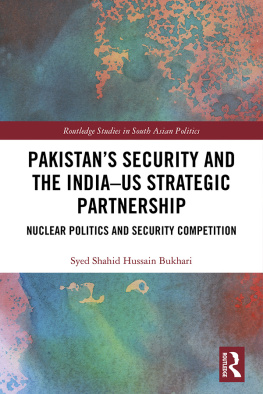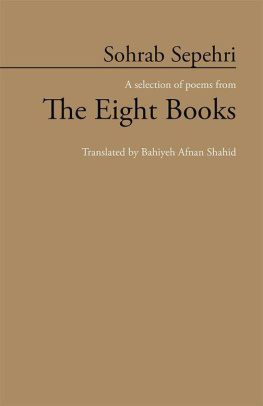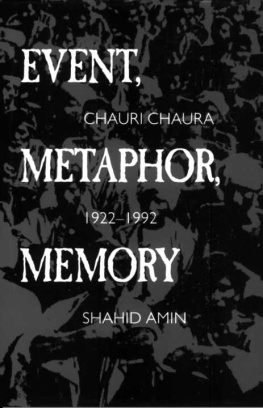Mr Shahid Javed Burki is Visiting Senior Research Fellow at the Institute of South Asian Studies National University of Singapore. He was educated at Oxford University as a Rhodes Scholar and at Harvard University as a Mason Fellow. He spent most of his professional life at the World Bank, where he held a number of senior positions, including Director of China and Mongolia Department (198794) as well as Vice President for Latin America and the Caribbean (199499). Mr Burki took leave of absence from the bank to take up the position of Pakistans Finance Minister (199697). His books include Changing Perceptions Altered Reality, Pakistans Economy under Musharraf (Oxford University Press); Beyond the Centre: Decentralising the State (World Bank), South Asia in the New World Order (Routledge), Pakistan: Fifty Years of Nationhood (Westview Press). He is Chairman of The Institute of Public Policy, a Lahore-based Pakistan think-tank, and resides in Washington DC.
Dr Iftekhar Ahmed Chowdhury is Principal Research Fellow at the Institute of South Asian Studies National University of Singapore. He was Foreign Advisor (Foreign Minister) of Bangladesh from 2007 to 2009. During his public service career of four decades, he has held the posts as Ambassador and Permanent Representative to both New York (200107), and Geneva (19962001). At the United Nations, he has also been chairman of a number of committees, including Social Commission, Population and Development Commission, Second (Economic) Committee, Information Committee and President of the Conference on Disarmament. He was knighted by the Pope in 1999. In 2004, the New York City Council issued a proclamation naming him as one of the worlds leading diplomats, acknowledging his global contribution to advancing welfare, alleviating poverty and combating terrorism. Dr Chowdhury has a PhD and MA in International Relations from the Australian National University, Canberra. He has been a prolific writer on issues pertaining to current multilateral diplomacy and contributes regularly to learned journals and the media.
Riaz Hassan is Emeritus Professor of Sociology at Flinders University and Visiting Research Professor at the Institute of South Asian Studies National University of Singapore. He has also held academic appointments at the University of California Los Angeles and Yale University. He was a Fulbright Scholar at the Ohio State University, from which he received his PhD in sociology. His recent publications include Inside Muslim Minds (Melbourne University Press), Islam and Society: Sociological Explorations (Melbourne University Press), Life as a Weapon: The Global Rise of Suicide Bombings (Routledge), Faithlines: Muslim Conceptions of Islam and Society (Oxford University Press). He is a Fellow of the Academy of the Social Sciences in Australia and a Member of the Order of Australia.
Praise for Afghanistan: The Next Phase
Afghanistan has loomed large in the foreign policies of the major democracies for more than three decades. In this insightful and important book, three scholars from different disciplines trace the background to the conflict and explain why Afghanistan is important to the region and to the wider international community. Their conclusions are novel and provocative, and point towards a way forward. Afghanistan: The Next Phase is essential reading for policy-makers, students and the interested public.
Ian McAllister, Professor of Political Science,
Australian National University
This provocative book challenges much conventional thinking about how a post-US Afghanistan can hope to become a stable, prospering country. Its authors posit compelling reasons why past and current shortcomings of the political order, most notably its lack of inclusivity, must be overcome for Afghanistan to succeed. Offering practical advice to policy makers, the book highlights the importance of concerted, cooperative international involvement in guiding the country towards a better future.
Emeritus Professor Marvin Weinbaum, Scholar in Residence,
The Middle East Institute, Washington, DC
This impressive new volume draws on the economics, sociology and international relations expertise of its authors to provide a fresh interdisciplinary template for making sense of a famously complicated and confounding country. At a time of great uncertainty for Afghanistan, this informative and highly accessible book is a must-read for the specialist and general reader alike.
Michael Kugelman, Senior Program Associate,
Woodrow Wilson Center for International Scholars, Washington, DC
A succinct and thoughtful analysis, especially covering the wide range of issues and challenges facing contemporary and post-2014 Afghanistan, which makes a powerful case for continuing and better-focused international engagement. In examining the correlation between the Bonn-sponsored efforts for political restructuring, stabilisation and economic reconstruction, the authors also look at as diverse undercurrents as the tenacity of a tribal culture, ethnic divisions, intractable extremist militancy and regional rivalries. The book offers important insights and conclusions and is essential reading for all those interested in and responsible for sustaining the current upturn in Afghanistans political and socio-economic environment.
Riaz Mohammad Khan, Former Foreign Secretary of Pakistan and author of Pakistan and
Afghanistan: Conflict, Extremism and Resistance to Modernity
This is a timely volume by three South Asia experts who have intimate knowledge of the situation in Afghanistan. The book not only enhances our understanding of the complex and daunting problems of Afghanistan, it seeks also to show the way out of an extremely complicated situation. Students of politics and international relations will find this a useful read.
Professor Tan Tai Yong, Director, Institute of South Asian Studies and
Vice Provost, National University of Singapore
This is a timely book. With the withdrawal of American troops from Afghanistan, the country faces many challenges. The new elected leadership of Afghanistan has already shown its determination to meet these security, political and economic challenges. After the successful military operation in North Waziristan, Pakistan has also offered full cooperation for achieving durable peace and stability in Afghanistan, critical for both countries.
Mr Sartaj Aziz, National Security and Foreign Affairs advisor to the
Prime Minister of Pakistan, Islamabad
MELBOURNE UNIVERSITY PRESS
An imprint of Melbourne University Publishing Limited
1115 Argyle Place South, Carlton, Victoria 3053, Australia
www.mup.com.au
First published 2014
Text individual pieces remains with individual contributors, 2014
Design and typography Melbourne University Publishing Limited, 2014
This book is copyright. Apart from any use permitted under the Copyright Act 1968 and subsequent amendments, no part may be reproduced, stored in a retrieval system or transmitted by any means or process whatsoever without the prior written permission of the publishers.
Every attempt has been made to locate the copyright holders for material quoted in this book. Any person or organisation that may have been overlooked or misattributed may contact the publisher.


